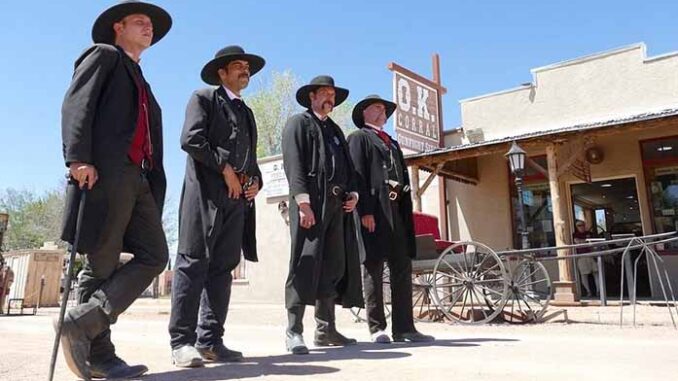
A showdown is coming in Tombstone – one that does not involve gambling, cattle, mining, or the Earps, but does pit the town’s most popular tourist attraction against its marshal and council.
On Monday, the Tombstone Historama Corporation filed a lawsuit alleging that city officials issued a notice last November that the company and its actors who perform multiple O.K. Corral gunfight shows each day would be criminally cited if they continued to engage in “walkdowns” in the city’s Historic Preservation District.
Walkdowns are something the O.K. Corral actors have done for nearly 15 years, and involves two actors walking in character as Virgil Earp, Morgan Earp, Wyatt Earp, or Doc Holliday along historic Allen Street. This occurs at various times during the day prior to the O.K. Corral gunfight show.
But according to city officials, the walkdowns violate Tombstone ordinances related to solicitation within the preservation district, which is also a National Historic Landmark District.
Soliciting is defined in the ordinance as an act to “entice, encourage or request donation or transfer of money or other thing of value from another person, regardless of the solicitor’s purpose or intended use of the money or other thing of value” even if done on public property.
The city attorney may pursue a criminal prosecution against any solicitor as well as the proprietor for violating the ordinances. In addition, the business can be hit with a separate administrative fine of up to $1,000 for a violation.
Attorneys for Tombstone Historama contend walkdowns are not intended to entice but instead are an exercise “of non-commercial speech, expression, association, assembly and movement” based on Old West culture. However, the city’s solicitation ordinance is overly broad and vague it fails to provide adequate notice of what conduct is prohibited during a walkdown, or if the mere act of a walkdown is itself a prohibited activity, the lawsuit argues.
“The Walkdowns do not involve speaking with visitors until approached, and when approached, actors simply answer whatever questions the visitors ask, regardless of whether it relates to a gun show or Tombstone in general,” according to the lawsuit. “At times, a visitor may ask an O.K. Corral actor to stand for a picture. But the picture is always requested by a visitor and not an O.K. Corral actor.”
The lawsuit also claims the City of Tombstone is “selectively enforcing” the solicitation ordinance by allowing other businesses to engage in similar walkdowns since November.
A Notice of Claim was served on the city in February as required by state law before a lawsuit can be initiated against a public entity. The city did not respond within 60 days, clearing the way for Tombstone Historama to engage in litigation.
The lawsuit seeks a court order declaring the city’s definition of soliciting is “vague and overbroad and fails to provide O.K. Corral with adequate notice of the prohibited conduct” and that the walkdowns do not violate the ordinance.
Even if the walkdowns are deemed to be soliciting, the lawsuit alternatively alleges a federal civil rights claim under the argument that the activity is protected commercial speech.
“The Walkdowns do not express speech that is fraudulent or illegal,” the lawsuit argues. “There is neither a compelling nor substantial governmental interest in prohibiting the Walkdowns. To the extent a governmental interest may be involved, the restriction created by the solicitation ordinance has not been narrowly tailored to that interest.”
Tombstone Historama is also seeking a court finding that the city defendants intentionally interfered with O.K. Corral’s business with visitors to Tombstone, thus causing a breach or termination of the business expectancy.
“O.K. Corral suffered damages in an amount to be proven at trial caused by the breach or termination of O.K. Corral’s business expectancy to be realized with visitors of Tombstone based on conducting the Walkdowns,” the lawsuit states.
In the lawsuit, the attorneys make a clear distinction between the walkdown activity and the separately prohibited “hawking” activity.
Hawking involves verbally drawing the attention of passersby in an attempt to promote a business or event. Tombstone put a stop to such conduct several years ago due to overwhelming complaints from visitors and storekeepers that the often belligerent verbal duals among employees of gunfight shows and other attractions detracted from the atmosphere of the historic district.
The lawsuit further contends walkdowns are not equivalent to hawking which “often hurts business rather than helps and leads to visitors not wanting to come back” to Tombstone.
“They are not saying how much a ticket costs for the O.K. Corral Reenactment. They are not saying when the next O.K. Corral Reenactment will occur. They are simply walking,” the lawsuit states.
The city will have 20 days to file an answer with the Cochise County Superior Court once the lawsuit is formally served.

